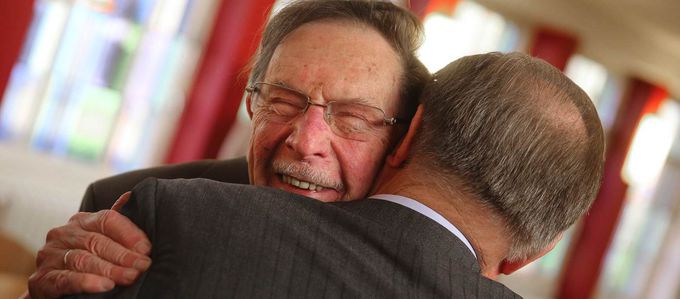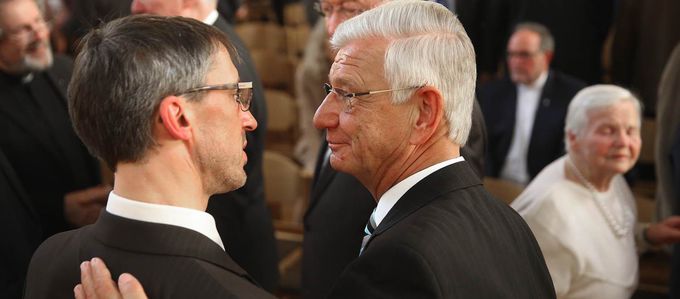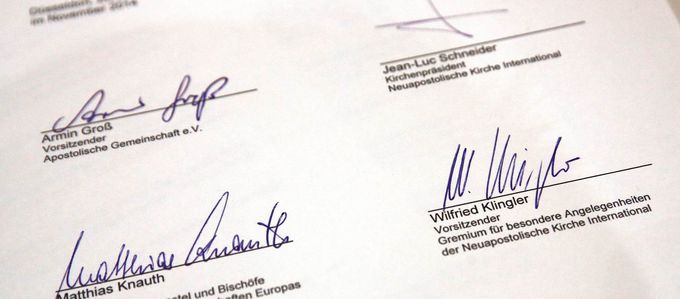
The Statement of Reconciliation between the New Apostolic Church and the Apostolic Community (Apostolische Gemeinschaft) in North Rhine-Westphalia in Germany is more than an interdenominational act. This was made clear by Chief Apostle Jean-Luc Schneider. The idea of reconciliation is something that should concern all brothers and sisters.
“I would like it to be taken seriously when we as Apostles speak about reconciliation,” Chief Apostle Schneider said. He said that he considers it his commission to carry the idea of reconciliation into the Church and make it a focal point. “I advise everyone to make a personal commitment and to live a life of reconciliation.”
The story on the reconciliation process
This is how an article ends in an upcoming copy of the German magazine Unsere Familie, in which the Chief Apostle goes into the reasons for this Statement of Reconciliation. On 29 November 2014, delegates from both churches signed the historic document. “The Apostolic Community and the New Apostolic Church both recognize and esteem each other as two separate entities, each with its own identity,” the core statement says. This ends a period of dispute that had started with a schism in 1955.
“After the death of Chief Apostle Johann Gottfried Bischoff, many years passed before a dialogue was resumed,” Chief Apostle Schneider explained, and outlined the long history of the conflict. The Information evening in December 2007 in Zurich was also discussed. The aim of the event was to present the history of the New Apostolic Church. “Obviously it was not the best way to bridge rifts, however. Only after the statement on the ‘message’ of Chief Apostle Bischoff was published by Chief Apostle Wilhelm Leber in May 2013, did the dialogue resume that has now resulted in the adopted declaration.”
“We are part of the church of Christ”
Regarding the statement made by Chief Apostle Bischoff that the Lord would return during his life-time, Chief Apostle Schneider said: “It was almost given dogmatic status.” The Chief Apostle further said: “Over time, and after many discussions, it became more and clear that the claim of divinity in this message was untenable.”
“In addition, the exclusivist definition and understanding the Church had at the time isolated us from all other denominations,” he added. “According to the understanding at the time, there was no salvation to be had outside of our Church. Today our doctrine is different. We are part of the church of Christ.”
The apostolate: the ministry of reconciliation
The Chief Apostle insists on the self-conception of the apostolate: “The Apostle ministry is the ministry of reconciliation. The mission of the Apostles is to preach reconciliation and reconcile the world with God. They must always have conciliatory thoughts and approach others in a spirit of conciliation. We therefore have no right to be irreconcilable with regard to other denominations only because we have not managed to come to terms with our common history.”
“Reconciliation implies that we admit our own mistakes and failures,” he emphasized, thinking of 1955 and the years that followed, when leading ministers and members of the New Apostolic Church were excommunicated. “According to the understanding of the Church at the time, this meant that these members were excluded from divine salvation. From our point of view today, this is inappropriate and harsh.”
“We apologize for this harshness,” the Chief Apostle said. “Both churches regret the fact that their members subsequently did not necessarily treat each other in a Christian way.”
The dialogue continues
At the same time, the Chief Apostle pointed the way into the future. “Our common goal is the reconciliation of two denominations who respect and esteem each other,” adding that a merger of the two churches is not planned. As this “merger of hearts” continues, the Christians of both churches are asked to accept each other also on the congregational and district level.
“It is our wish to continue on the path of reconciliation that we have set out on with other apostolic denominations,” Chief Apostle Schneider said. Such apostolic denominations exist on all continents. There are several in the Netherlands, in Germany, in Switzerland, in Australia, in South Africa, and in the USA.
















